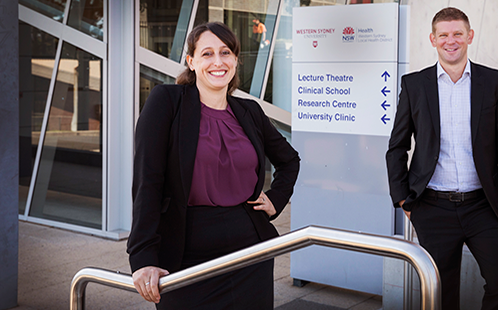
Associate Professor Genevieve Steiner and Dr Caleb Ferguson.
Western Sydney University has been awarded two significant medical research grants worth over $2.1 million to further develop innovative strategies and approaches towards dementia prevention and treatment of atrial fibrillation, both common and devastating conditions that cut short lives across the world.
Associate Professor Genevieve Steiner, an NHMRC-ARC Dementia Research Development Fellow from the University’s NICM Health Research Institute, received $1.5 million in funding for her project, Teaching an old brain new tricks: optimising cognitive training through neuroplasticity (APP1195709).
The project aims to prevent decline in dementia as the leading cause of death of women in Australia, and the second-leading cause for all Australians, surpassing heart disease.
Associate Professor Steiner hopes this research enables older people to remain independent, stay functioning with diminished disability from dementia.
“Cognitive training is an early intervention and prevention strategy that offers hope for people with the early signs of dementia and shows promise in delaying deterioration, reducing dementia risk and its incidence,” says Associate Professor Steiner.
“The challenge, however, is to translate what we know about cognitive training to improve the everyday lives of Australians affected by the condition. This research program aims to optimise cognitive training by enhancing neuroplasticity, which is the brain’s in-built ability to adapt and rewire itself.”
The second major grant of $606,000 from the National Health and Medical Research Council (NHMRC) (APP1196262) is awarded to Dr Caleb Ferguson, Senior Research Fellow and Heart Foundation Postdoctoral Fellow from the Western Sydney Nursing and Midwifery Research Centre (Western Sydney University School of Nursing and Midwifery and Western Sydney Local Health District) and the Translational Health Research Institute (THRI).
Dr Ferguson will conduct a new trial into the world’s most common heart rhythm disorder, atrial fibrillation (AF), a condition where the heart beats irregularly. AF is a major risk factor for stroke, heart failure and dementia as well as the leading cause of cardiovascular hospitalisation in Australia.
The study, titled INFORM-AF: a randomised controlled trial to assess the efficacy of a digital education program for atrial fibrillation, will design, and evaluate a digital education intervention aimed to improve self-care practices, quality of life and reduce potentially avoidable hospitalisations.
“INFORM-AF builds on previous successful research programs at the University that partner with patients, families, clinicians and key stakeholders in educational intervention development, and evaluation,” said Dr Ferguson.
Deputy Vice-Chancellor and Vice President (Research, Enterprise and International) Professor Deborah Sweeney, commended the researchers on leading these important programs that will help improve the quality of life for many Australians.
“These grants reflect Western Sydney University’s investment and commitment to improving health in our region and internationally, and shine a spotlight on the world-class expertise and translational health capabilities in our schools and research institutes,” said Professor Sweeney.







